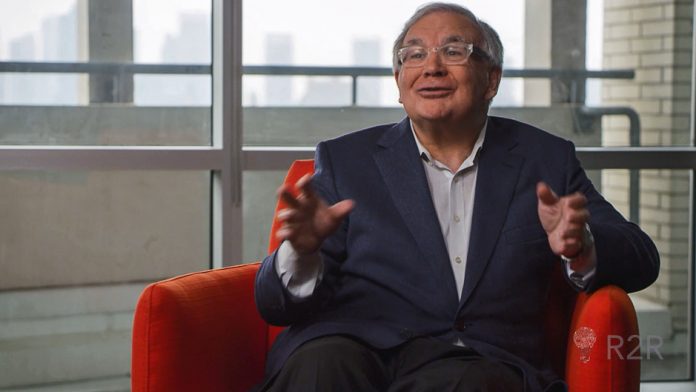Dick Peltier is a Professor of Physics and the Director of the Centre for Global Change Science at the University of Toronto. We asked everything from why he chose his field of study to what’s on his playlist in hopes of giving you a better understanding of what goes on outside the lab for one of the best minds in Canadian research.
What inspired you to become a scientist?
I had always been curious about the natural world. At the University of British Columbia I eventually did my third year of study twice! Once in Earth Science and then again in Physics as I was very interested in the Earth but also in understanding at a deeper more mathematical level.
What do you like most about being a scientist?
For me there are two profound sources of satisfaction in science, the first being the thrill that comes when you finally understand the solution to a problem that has been gnawing at you for a very long time. The second is in witnessing the development of young scholars as they grow into professionals in their own right.
What do you envision in the future of your field?
I currently work primarily on problems critical to our understanding of Earth’s climate system, in particular on the global warming problem that is one of the most pressing problems that society is currently facing. I foresee a time in the not very distant future when we will be able to make probabilistically accurate projections of climate change impacts that will have dramatic influence upon environmental policy at the regional scale.
How will your research make a difference in our lives?
This science is critical to the development of the consensus required for the international community to take the massive action necessary to ensure that society may be transformed so as to shift onto a sustainable trajectory of continuing development. Our current course is leading in a direction that could prove catastrophic.
What advice would you give young researchers?
Work on problems that engage your curiosity passionately as well as intellectually.
What do you consider your greatest achievement?
I have been working to develop an understanding of the manner in which the many components of the physical “Earth System” interact so as to control the planet’s evolution through time. This has forced to to cross the disciplinary boundaries that separate atmosphere from ocean and both from the earths deep interior. By working in this way I have been able to provide original explanations of a wide range of different Earth System observables, concerning Earth rotation, concerning the origins of ice ages and astronomical impacts upon them, concerning the continental drift process, and concerning long timescale evolution of the ocean circulation and its climate impacts.
What do you read?
I’m currently reading the novels of Joseph Boyden but I’ve recently finished Salman Rushdie’s book “Joseph Anton” and Sam Harris’s book “The Moral Landscape.”
What’s on your playlist?
The music I listen to ranges from Edith Piaf to Billy Holiday to Winton Marsalis, to John Williams but on the radio my wife and I flip back and forth between the classical and jazz stations.
If you could meet any historical figure who would it be and why?
Especially on this day I’m thinking of John Nash.
If you could do any profession other than your own what would it be?
Before I began university I had always wanted to be a writer or an architect.
What do you like to do for fun?
I love the theatre and Toronto is a wonderful theatre town–my wife Claude and I are in one theatre or another most weeks!
Want to learn even more about Prof. Peltier? Check out his Orange Chair Interview.









































